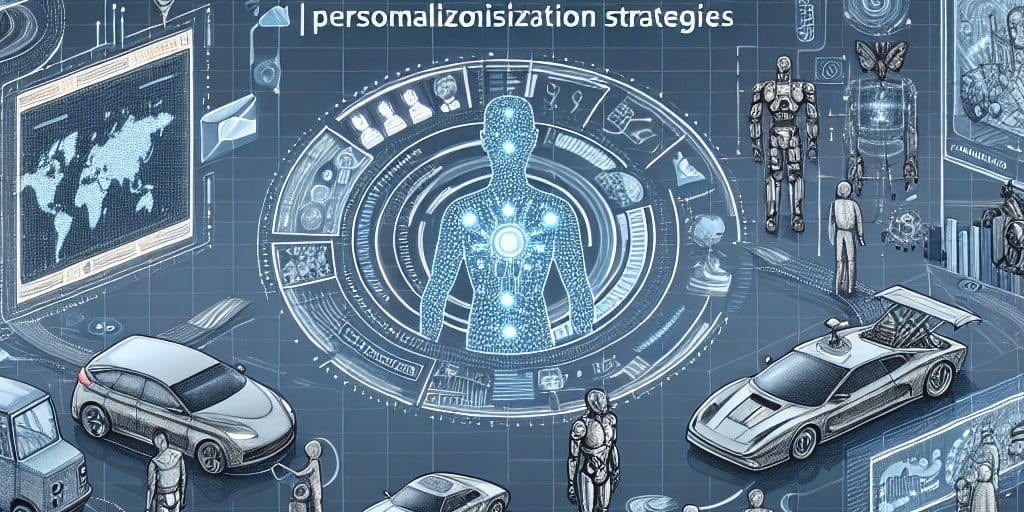AI-Driven Personalization Strategies in 2023 in 2025

AI-Driven Personalization Strategies in 2025
Exploring the Future of Customized Consumer Experiences
As we approach 2025, the landscape of digital marketing continues to evolve at a breakneck pace. Central to this transformation is the role of Artificial Intelligence (AI) in driving advanced personalization strategies. This blog post delves into how businesses are leveraging AI to deliver unprecedented levels of personalization, enhancing customer satisfaction and driving revenue growth.
The Evolution of AI in Personalization
Over the past decade, AI has progressed from basic automation and recommendations to deep learning and predictive analytics, enabling hyper-personalized customer experiences. In 2025, AI technologies have matured significantly, allowing businesses to understand and anticipate customer needs with remarkable precision.
Key Strategies for AI-Driven Personalization in 2025
-
Real-Time Personalization:
Companies are now capable of analyzing customer interactions in real-time to offer personalized content, recommendations, and solutions instantaneously. This is made possible by powerful AI algorithms capable of processing vast amounts of data in milliseconds.
-
Predictive Customer Journeys:
AI tools predict future customer behaviors based on historical data, social media activities, and other digital footprints. This enables businesses to craft personalized marketing strategies that cater to the future needs of their customers.
-
Enhanced Customer Segmentation:
With AI, segmentation goes beyond traditional demographics. Advanced algorithms analyze behaviors, preferences, and psychographic factors to create micro-segments. This allows for more targeted and relevant marketing campaigns.
Case Studies
1. E-Commerce Giant: Amazon
Amazon continues to set the standard for AI-driven personalization. In 2025, it utilizes AI to analyze customer reviews, search patterns, and purchase history to personalize the shopping experience at an individual level. This has resulted in a 35% increase in customer retention rates according to recent statistics.
2. Streaming Service: Netflix
Netflix uses AI to not only recommend movies and shows but also to personalize marketing messages and notifications sent to users. Their AI analyzes viewing habits to predict which new releases will be most appealing to which segments of its audience, boosting their user engagement rates significantly.
3. Retail Chain: Target
Target has implemented AI-driven personalization by integrating IoT (Internet of Things) with their customer’s shopping experience. Smart carts equipped with AI capabilities offer personalized discounts and shopping suggestions based on the customer’s in-store behavior and online shopping history.
Impact of AI Personalization on Business Metrics
Statistics reveal the profound impact of AI-driven personalization:
- Customer Satisfaction: Businesses that adopted advanced AI personalization strategies saw a 25% increase in overall customer satisfaction.
- Revenue: Personalization can deliver 5-15% revenue growth for companies in the retail sector.
- Customer Retention: AI personalization strategies have led to a 10% decrease in customer churn on average.
Challenges and Ethical Considerations
Despite the benefits, the use of AI in personalization is not without challenges. Privacy concerns are paramount, as customers become increasingly wary of how their personal data is used. Furthermore, there is the risk of AI bias, where algorithms might create unfair advantages or disadvantages for certain user segments.
Conclusion
In 2025, AI-driven personalization continues to transform how businesses interact with their customers. By leveraging sophisticated AI technologies, companies can provide highly personalized experiences that not only meet but anticipate the needs and preferences of their customers. However, it is crucial for businesses to navigate the ethical implications and maintain transparency with their customers to foster trust and loyalty.
FAQ: AI-Driven Personalization Strategies in 2023
- What is AI-driven personalization in marketing?
- AI-driven personalization in marketing refers to the use of artificial intelligence technologies to tailor content, recommendations, and experiences specifically to individual user preferences and behaviors, enhancing engagement and conversion rates.
- How can AI improve customer experience in 2023?
- In 2023, AI can improve customer experience by analyzing large datasets to predict customer preferences and behaviors, enabling real-time customization of marketing messages, optimizing user journeys, and providing personalized customer support through AI chatbots.
- What are the key benefits of using AI for personalization?
- The key benefits include increased conversion rates, enhanced customer satisfaction and loyalty, improved efficiency in marketing campaigns, and the ability to deliver highly relevant content and offers to individual users, thereby maximizing the ROI on marketing investments.
- Are there any privacy concerns with AI-driven personalization?
- Yes, privacy concerns are significant. It's crucial to ensure compliance with data protection regulations like GDPR and CCPA. Transparent data collection, securing user consent, and providing clear opt-out options are essential practices to address these concerns.
- What skills are essential for marketers to leverage AI in personalization strategies?
- Marketers need a blend of skills in data analytics, machine learning, and marketing technology. Understanding the ethical implications of AI and maintaining up-to-date knowledge on privacy laws are also critical.
- `) to format the questions (`
- `) and answers (`
- `).
